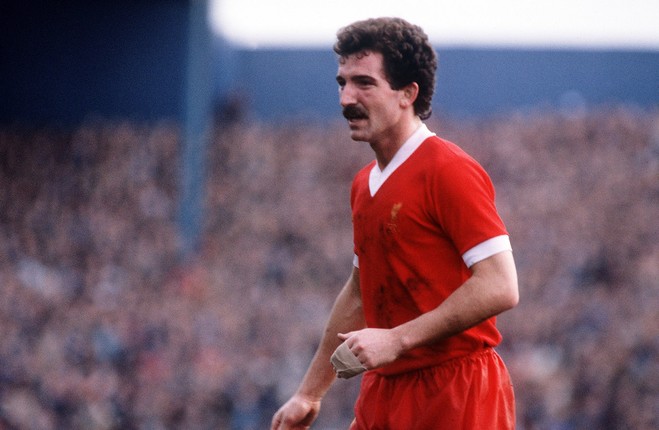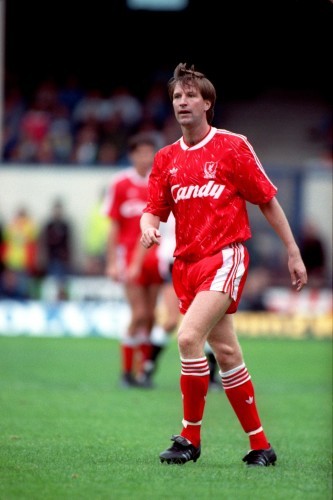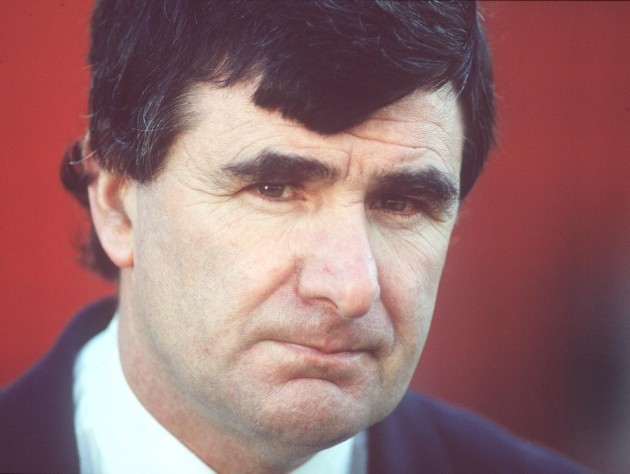NOWADAYS, THE PROSPECT of the reigning Premier League champions coming up against a League of Ireland team in a competitive fixture seem remote.
Not so long ago though, it was a distinct possibility.
Before the best sides were given byes to the group stages and when the Champions League was simply known as the European Cup, Irish teams would frequently come up against some of the top clubs in Europe.
Rather than Dundalk preparing to face the relatively obscure Riga FC in the Champions League tonight, there would often be matches such as the famous encounter between Athlone and AC Milan, or Limerick coming up against the might of Real Madrid.
The Lilywhites themselves were no strangers to these glamour ties. On 15 September 1982, reigning English champions Liverpool came to Oriel Park for a first-round European Cup tie.
It was a proper David and Goliath clash. Dundalk were a team of part-timers, while Liverpool had won three of the last five European Cups.
According to the official Lilyhwhites website, 16,000 people squeezed into Oriel Park for the occasion, with record gate receipts of £68,000.
Despite Liverpool’s formidable squad and history, Dundalk were optimistic they could hold their own. The previous season, they had played in the Cup Winners’ Cup against a Tottenham side that included Ossie Ardiles and Glenn Hoddle, along with Irish internationals Chris Hughton and Tony Galvin. On that occasion, they had given Spurs an almighty scare, drawing 1-1 at Oriel Park, before the North Londoners edged the second leg at White Hart Lane 1-0 thanks to Garth Crooks’ deflected goal.
The Irish side received a standing ovation by both sets of supporters that night, and they were hoping for another stirring display amid an even greater challenge.
On this occasion, however, the contest was more one-sided. Ronnie Whelan, aged just 20 at the time, opened the scoring after only seven minutes to silence the home fans, before the Irish international doubled his team’s advantage just before the half-hour mark.
Three minutes later, Ian Rush made it 3-0 with a typically clinical finish, before David Hodgson registered the fourth 10 minutes after the break.
Leo Flanagan’s brilliant free kick reduced the arrears in the dying stages, but it was scant consolation on a disappointing night for Dundalk.
They got the edge on us early on,” Mick Fairclough, who was part of the Dundalk team that day, tells The42. “They were just so strong and it was an uphill battle. We had such a strong defence. [If we didn't] we would have come out of it a lot worse than we did in the first game.
“But the players they had, Kenny Dalglish, Ian Rush, Ronnie Whelan and all those guys, it was a fantastic side.
“There was a hell of a crowd there. Back in those days it wasn’t so much TV or anything like that. It’s much more in-your-face now that games are on live, that kind of stuff. I don’t event recall the highlights on at that stage.
“But around the locality, it was a huge game. There are so many Liverpool and Man United supporters around the country. So it was a huge day and a lot of hype locally about it.”
And did a substantial proportion of the hefty crowd comprise of Irish Liverpool supporters, rather than the vast majority cheering on Dundalk?
“There was a good lot in that category, but there was a hell of a great crowd from Dundalk and we got fantastic support.
“I suppose with the way the game went, it probably dampened it down a little bit. If we had been in the game like we were against Tottenham the previous year, I think there would have been a lot more fanatical support. The previous year, when we played Tottenham, it was unbelievable. The way that game went [against Liverpool], we were 2-0 down before we realised where we were. Once it went to that, we were chasing the game.
“I think we did actually believe that we could give them a good game. We were buoyed on by the performance against Tottenham the previous year. We felt we could give everybody a game. If we had been able to hold out and keep them scoreless for a bit longer, frustration builds with a lot of these teams and things could go like they hadn’t expected.
I remember they were so disappointed that they conceded a goal. They really weren’t going out and taking things lightly. I remember Phil Thompson saying in the bar afterwards that they were really disappointed that they conceded a goal. So that was the kind of level of intensity that we were up against. And with the ability that they had, it was really no contest. It would have been a huge upset if we had managed to hold them.”
Unlike most of his team-mates, Fairclough actually had experience of playing top English sides on a regular basis. The attacker, who was capped by Ireland twice, had spent a couple of years playing with Huddersfield Town in the First Division during the 1970s. A bad injury cut short his time in England, with the Drogheda native subsequently coming home and ending up back where he had started — the League of Ireland.
“I was a little bit different from the others in that I had played in England in the First Division against all the top sides. I had to finish then with an injury. So for me to be playing at all was just such a bonus. I really savoured that period in my career where I was dead in one sense and came back to life. Here I was playing against the top sides in Europe.
“The younger lads would have been a lot more nervous. Barry Keogh was a fantastic prospect at the time. He was probably a little bit nervous, because it was all new to him. But I just loved every minute of it. I enjoyed the reprieve I had been given from being finished with an injury.”
Later that month, Dundalk came over to Anfield for the return leg. The last time they had been at the famous ground was for an Inter-Cities Fairs Cup match in 1969, where they were subjected to a 10-0 mauling, with Tommy Smith, Ian Callaghan, Alun Evans and Bobby Graham among the scorers that day. 13 years on, despite there being just one player still at Dundalk who had played that day (Tommy McConville), many critics were predicting another drubbing.
“We were gutted with the 4-1 defeat,” says Fairclough. “If we were beaten 1-0, we would have been able to hold our heads up, but we felt we had not performed to the highest level we could. I think everyone had the attitude going over there that they’re not going to really trounce us and we’re going to go down fighting, leave everything out on the pitch.
“I think one of the programmes were talking about Dundalk playing Liverpool and they were saying ‘the last time was 10-0 and it could be the same this time’. I suppose that gave us a little bit more resolve to prove everybody wrong that we could actually go and get a good result.”
And ultimately, Dundalk managed to restore some pride after the first-leg disappointment. Whelan was on target yet again, though it was late on to score the game’s only goal, as the Irish club came despeartely close to holding their more illustrious counterparts.
When we went over to Anfield, we had a much more creditable performance. They beat us 1-0. Ronnie Whelan scored a screamer. We set ourselves up to defend that day. We probably were a little bit naive in the first game. We thought we could take them on and they caught us flat. It was disappointing to get beat by so much in the first game, because the whole thing was dead. But against such a good side, there are probably many other teams that would have went down by more.
“We really knuckled down [in the second leg] and I suppose we frustrated them a lot. I remember Graeme Souness had the ball and ‘Pop’ Flanagan was just standing off him. Souness said: ‘Come on, take it off me.’ Pop says: ‘You’re the one getting the big money, you pass me by’. He knew if he tried that, Pop would have kicked him up in the air. So we did go toe-to-toe with them over there.
“Sean Byrne that night was incredible. [The goalkeeper] Richie Blackmore was outstanding in both games.
“It was great [to play at Anfield] and the atmosphere was good. All the Liverpool fans had turned up to see a showboating performance that they were going to tip-tap around and score a load of goals. For them, they were probably a little disappointed on the night.”
Fairclough credits a resolute backs-to-the-wall performance for the improved display in the second leg.
“We knew we couldn’t for ability, but for pure resolve, we definitely beat them in that regard.”
Now 66, the former Dundalk player cites Rush, Whelan and Souness among the most impressive performers, with the latter delivering a characteristically fiery display.
He got plenty as well. He may have been a little bit surprised. Some of our midfielders were equally as tough. We might not have had the same ability, but we certainly had the same amount or more toughness. He didn’t like it on a couple of occasions, but that’s the game and you have to take the rough with the smooth. He was very magnanimous afterwards. Al of them were very nice and very respectful of us. There were no smart comments certainly that I can remember.
“They came up to the bar in Oriel just for a sandwich and something. They didn’t stay long now. And we went over to their players’ lounge over there. There was a little bit of mingling, but not as much as there would be if they were playing an English side where they knew all the players and all that kind of stuff.
“In that era, they were probably the best side in Europe. We were disappointed in the first game. But for us to keep the score down in Anfield was a big achievement.
“That defence we had at the time with Richie Blackmore, Paddy Dunning, Tommy McConville, Martin Lawlor and Eamon Gregg, it was a tremendous record we had. In the league here and in any of the other games, they were outstanding.
“When I was playing in the League of Ireland, you kind of knew that nobody was going to get many goals against you. You could nearly bet that if you were playing somebody, they wouldn’t score, so all we had to do was get one.”
Despite the commendable second-leg display, Dundalk’s form gradually tapered off, while Liverpool retained their league title, but got dumped out of that year’s European Cup at the quarter-final stage by Polish team Widzew Łódź.
Having been crowned champions in 1982, Dundalk finished third that year and would be eclipsed by the Shamrock Rovers ‘four-in-a-row’ side for the next few seasons, before wining the title again in 1988, by which point Fairclough and many of his ’82 team-mates were long gone. The former player believes the departure of manager Jim McLoughlin, who would subsequently manage Rovers to three of their four title wins, contributed significantly to their domestic decline.
“It’s very hard to keep winning things and keep the desire there. We kept that up for a number of seasons and then Jim moved up to Rovers. When he left, the wheels sort of came off the wagon. He was such a part of the whole thing. He created it and kept it going. When he went, there was really nobody to steer the ship.”
– First published 07.00, 17 July
The42 is on Instagram! Tap the button below on your phone to follow us!



